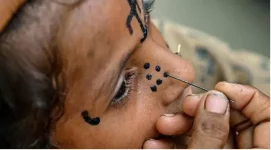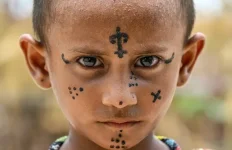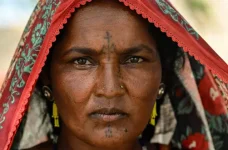After mixing charcoal with a few drops of goat’s milk, Basran Jogi, 60, turns with his needle to his guests of the day: two Pakistani children who have come to receive their first traditional tattoo.

In the Hindu villages on the eastern border of Pakistan, near India, tattoo artists have been drawing needle lines of dots, circles and other geometric ornamentations on the faces, arms and hands of girls for centuries.
'First, two straight lines are drawn between the eyebrows,' Ms Jogi explains to a friend who has just grasped a sewing needle.
And now we push the needle between these two lines, slowly, until the blood appears,' she continues.

Pooja, six years old, makes a grimace as the points begin to form circles and triangles of dots on his forehead and chin.
His eldest daughter, Champa, seven years old, is impatient: "I am ready too."
This long-order scene is becoming increasingly rare in recent years, as more and more Hindu families -- only 2 per cent of the 255 million people of the Islamic Republic of Pakistan -- move into the city.
"Our generation no longer likes them. In the age of social media, young girls avoid tattooing their faces because they find that with these drawings they would be seen as different and unattractive,' she told AFP.
His sister Mumta also refused to be tattooed with the dots that adorn the faces of their mother and their two grandmothers.
But "if we had stayed in the village, we would surely have these tattoos on our faces or arms," she said.
In a country where non-Muslim minorities claim to be discriminated against in many areas, 'we cannot force our daughters to continue' to tattoo, says Mukesh Meghwar, a defender of the rights of Hindus.
"It's their choice. But unfortunately, we will probably be the last generation to see tattoos on women's faces, necks, hands and arms,' he continues, pointing also to the 'favourable' reflections of fellow citizens, because some schools in Islam condemn the tattoo.

This would then be the end of a multicentennial practice, deeply rooted in culture, anthropologists say.
So much so that most Hindus interviewed by AFP plead for the tattoo but admit that they cannot explain its meaning or origin.
"These "marks" were traditionally used to distinguish members of a community and to "move evil spirits," he explains.
For Mrs Jogi, tattooing is above all a "passion" for embellishing women's faces.
"We don't do them for a particular reason, it's a practice that's been around for a long time," she says, carefully examining the freshly tattooed faces of Pooja and Champa.
Today, the points that now adorn their foreheads are deep black, soon they will become dark green and hold until their last breath.
Basran Jogi and Jamna Kolhi can testify to this.
"These tattoos, it was a childhood friend who drew them to me, she died a few years ago," says 40-year-old Ms Kolhi.
"When I see them, I think about her and our young years. It's a lifelong memory."

In the Hindu villages on the eastern border of Pakistan, near India, tattoo artists have been drawing needle lines of dots, circles and other geometric ornamentations on the faces, arms and hands of girls for centuries.
'First, two straight lines are drawn between the eyebrows,' Ms Jogi explains to a friend who has just grasped a sewing needle.
And now we push the needle between these two lines, slowly, until the blood appears,' she continues.

Pooja, six years old, makes a grimace as the points begin to form circles and triangles of dots on his forehead and chin.
His eldest daughter, Champa, seven years old, is impatient: "I am ready too."
This long-order scene is becoming increasingly rare in recent years, as more and more Hindu families -- only 2 per cent of the 255 million people of the Islamic Republic of Pakistan -- move into the city.
Melting into the crowd
"These tattoos make us identifiable among the crowd," explains 20-year-old computer engineering student Durga Prem, from Badin, a town in the southern province of Sindh where the Hindu minority is concentrated."Our generation no longer likes them. In the age of social media, young girls avoid tattooing their faces because they find that with these drawings they would be seen as different and unattractive,' she told AFP.
His sister Mumta also refused to be tattooed with the dots that adorn the faces of their mother and their two grandmothers.
But "if we had stayed in the village, we would surely have these tattoos on our faces or arms," she said.
In a country where non-Muslim minorities claim to be discriminated against in many areas, 'we cannot force our daughters to continue' to tattoo, says Mukesh Meghwar, a defender of the rights of Hindus.
"It's their choice. But unfortunately, we will probably be the last generation to see tattoos on women's faces, necks, hands and arms,' he continues, pointing also to the 'favourable' reflections of fellow citizens, because some schools in Islam condemn the tattoo.

This would then be the end of a multicentennial practice, deeply rooted in culture, anthropologists say.
So much so that most Hindus interviewed by AFP plead for the tattoo but admit that they cannot explain its meaning or origin.
Away for evil spirits
"These symbols are part of the culture of the peoples of the Indus civilization", in the Bronze Age era, says one of these anthropologists, zulfiqar Ali Kalhoro."These "marks" were traditionally used to distinguish members of a community and to "move evil spirits," he explains.
For Mrs Jogi, tattooing is above all a "passion" for embellishing women's faces.
"We don't do them for a particular reason, it's a practice that's been around for a long time," she says, carefully examining the freshly tattooed faces of Pooja and Champa.
Today, the points that now adorn their foreheads are deep black, soon they will become dark green and hold until their last breath.
Basran Jogi and Jamna Kolhi can testify to this.
"These tattoos, it was a childhood friend who drew them to me, she died a few years ago," says 40-year-old Ms Kolhi.
"When I see them, I think about her and our young years. It's a lifelong memory."